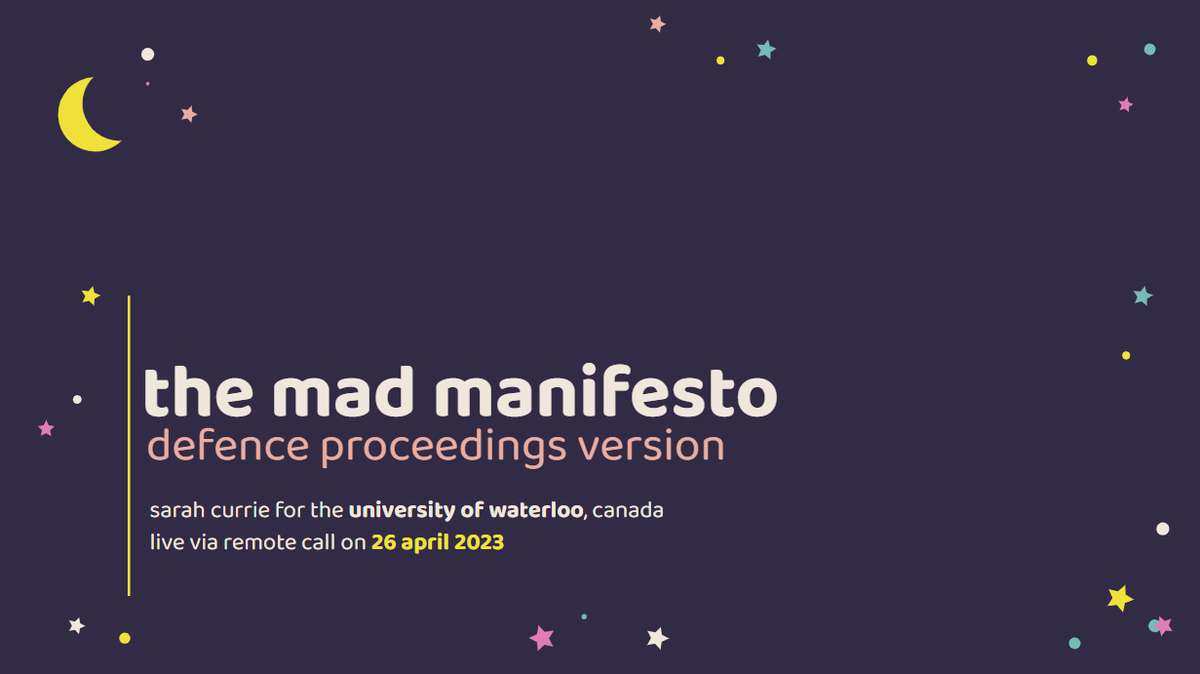[teaching theory+resources megathread 🌻🥰]
okay it's finally here, i've got the ENTIRE FIRST YEAR WRITING/COMMS COURSE uploaded for you to remix, revise and make better for your kaleidoscopic context. this thread will go over the highlights of what's in this drive for you!! 🤍
okay it's finally here, i've got the ENTIRE FIRST YEAR WRITING/COMMS COURSE uploaded for you to remix, revise and make better for your kaleidoscopic context. this thread will go over the highlights of what's in this drive for you!! 🤍

THIS IS THE DRIVE WITH ALL COMPONENTS (except for the open-access readings / every reading on this course is available FOR FREE online to reduce course cost!!): drive.google.com/drive/folders/…
The folder is sub-sorted by weeks. This is a 12 week course with one week break between #6-7.
The folder is sub-sorted by weeks. This is a 12 week course with one week break between #6-7.
WEEK ONE
absolute intro to rhetoric and the course itself. i have a fairly involved but accessible Discord Onboarding doc that i've shared in other threads. i run this course hybrid as reinforcement, but also accessibility. the server is a huge support model in this class.
absolute intro to rhetoric and the course itself. i have a fairly involved but accessible Discord Onboarding doc that i've shared in other threads. i run this course hybrid as reinforcement, but also accessibility. the server is a huge support model in this class.

WEEK ONE
one of the core themes of this course is "everything is mediated". i start this course by asking what we use to communicate, and what a "discourse community" is. when we invite people into our circles, we must also be hyper-aware of who is not in the circle - and why.
one of the core themes of this course is "everything is mediated". i start this course by asking what we use to communicate, and what a "discourse community" is. when we invite people into our circles, we must also be hyper-aware of who is not in the circle - and why.

WEEK ONE
every week (except Teach-Arounds) has a LAB INVESTIGATION, a practical or teamplay activity that uses the theory we learned that week in class to try to create something new. the first lab is creative writing: they must use believability strategies to make fake news.
every week (except Teach-Arounds) has a LAB INVESTIGATION, a practical or teamplay activity that uses the theory we learned that week in class to try to create something new. the first lab is creative writing: they must use believability strategies to make fake news.

WEEK TWO
the first chapter (for free online) of 1984 is the core text: this is science communication at its most powerful to create dystopia. i make them read Ch 1 once in week 2, then again in week 12: the way they read *control* changes significantly at the end of the course.
the first chapter (for free online) of 1984 is the core text: this is science communication at its most powerful to create dystopia. i make them read Ch 1 once in week 2, then again in week 12: the way they read *control* changes significantly at the end of the course.
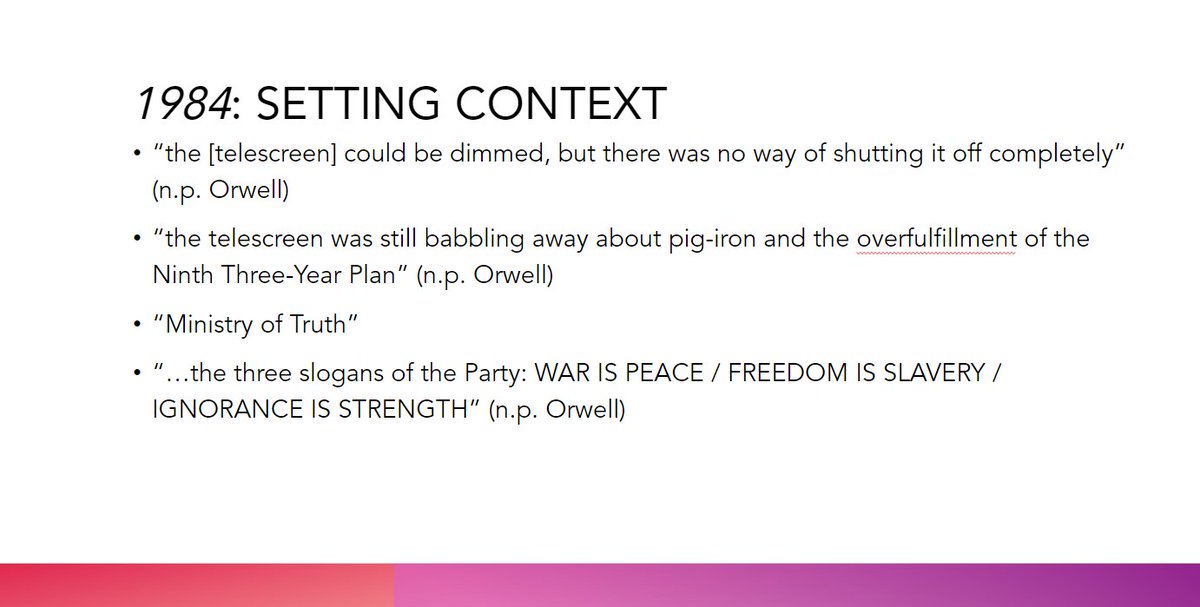
WEEK TWO
at the start, we know that viewpoint matters. i can't stop you from googling something, but i CAN stop you from wanting to if i'm rhetorically savvy. 1984 shows how to powerfully abuse this - but we can also use it for good. we can make people care about our research.
at the start, we know that viewpoint matters. i can't stop you from googling something, but i CAN stop you from wanting to if i'm rhetorically savvy. 1984 shows how to powerfully abuse this - but we can also use it for good. we can make people care about our research.

WEEK TWO
they are assigned their teamplay midterm: a group essay on a well-developed thesis of their choice.
this assessment is a LOT more concerned with teaching "soft skills": how to collaborate, how to source, how to divide tasks, how to schedule a large project timeline.
they are assigned their teamplay midterm: a group essay on a well-developed thesis of their choice.
this assessment is a LOT more concerned with teaching "soft skills": how to collaborate, how to source, how to divide tasks, how to schedule a large project timeline.

WEEK THREE
week 3 uses three youtube videos about radically different topics to show different ways to mediate a thesis/argument. i call this "engineering" or "reverse-engineering" a thesis: how do we decide what information is important? how am i approaching a mediated thesis?
week 3 uses three youtube videos about radically different topics to show different ways to mediate a thesis/argument. i call this "engineering" or "reverse-engineering" a thesis: how do we decide what information is important? how am i approaching a mediated thesis?

WEEK THREE
the videos i use for this investigation are:
Kurzgesagt: Who Is Responsible for Climate Change?
Wisecrack: The Philosophy of 'Rick and Morty'
Innuendo Studios: Superposition: The Genre of 'Life is Strange'
the videos i use for this investigation are:
Kurzgesagt: Who Is Responsible for Climate Change?
Wisecrack: The Philosophy of 'Rick and Morty'
Innuendo Studios: Superposition: The Genre of 'Life is Strange'
WEEK THREE
I use this investigation to show the difference b/t "truth" and "capital-T Truth".
capital-T Truth wants to be right, and it wants to silence all other opinions.
good args know that "truth" is really just "the best available version we have right now", and can change
I use this investigation to show the difference b/t "truth" and "capital-T Truth".
capital-T Truth wants to be right, and it wants to silence all other opinions.
good args know that "truth" is really just "the best available version we have right now", and can change
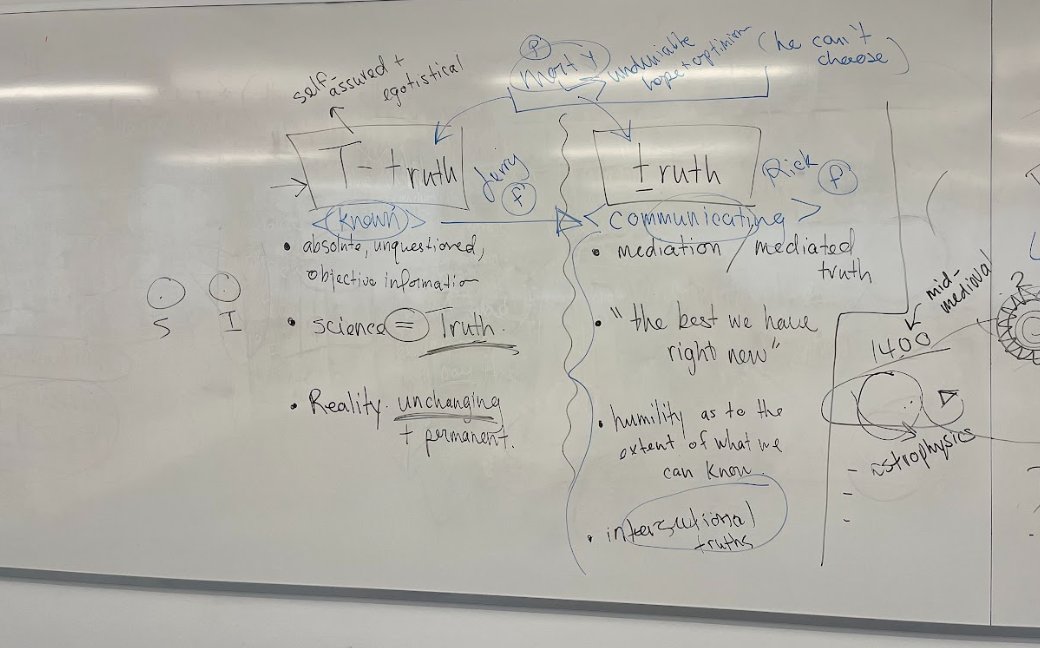
WEEK FOUR
now we can push these videos a little further: can they be metaphors of the ways scientific research is flawed, or extremely complicated? in my mind, there are 3 problems with scicomm:
- research aporias
- (endless) pursuit of enlightenment
- ethical sci translation
now we can push these videos a little further: can they be metaphors of the ways scientific research is flawed, or extremely complicated? in my mind, there are 3 problems with scicomm:
- research aporias
- (endless) pursuit of enlightenment
- ethical sci translation

WEEK FOUR
this week is the Sustainabilitea lab investigation, which i have other threads about! it's a practical chemistry experiment - but it has a translational point. we reverse-engineer a thesis, then we have to explain it to non-science actors with an accessible manual.💚
this week is the Sustainabilitea lab investigation, which i have other threads about! it's a practical chemistry experiment - but it has a translational point. we reverse-engineer a thesis, then we have to explain it to non-science actors with an accessible manual.💚

WEEK FIVE
okay, let's reinforce before i make this harder. we learned about discourse communities, tribalism, capital T-truth, propaganda, believability, and well-crafted thesis/hypothesis statements. it is good to review at this point, because this is a lot for a 1y class.
okay, let's reinforce before i make this harder. we learned about discourse communities, tribalism, capital T-truth, propaganda, believability, and well-crafted thesis/hypothesis statements. it is good to review at this point, because this is a lot for a 1y class.

WEEK FIVE
they listened to a Spotify podcast about Joe Rogan / and a blog post about SpiKey (a bad-faith sci investigation). using this, i can reinforce concepts they already know another way - doing "the same thing" multiple ways will capture more students in uptake:
they listened to a Spotify podcast about Joe Rogan / and a blog post about SpiKey (a bad-faith sci investigation). using this, i can reinforce concepts they already know another way - doing "the same thing" multiple ways will capture more students in uptake:

WEEK FIVE
the lab investigation this week is one of their course favourites(??) lol: i ask them to write a false (believable) COURT TRANSCRIPT about a scientist or public figure who has been creating bad-faith arguments, and they have to try to "catch" their rhetorical trick.
the lab investigation this week is one of their course favourites(??) lol: i ask them to write a false (believable) COURT TRANSCRIPT about a scientist or public figure who has been creating bad-faith arguments, and they have to try to "catch" their rhetorical trick.
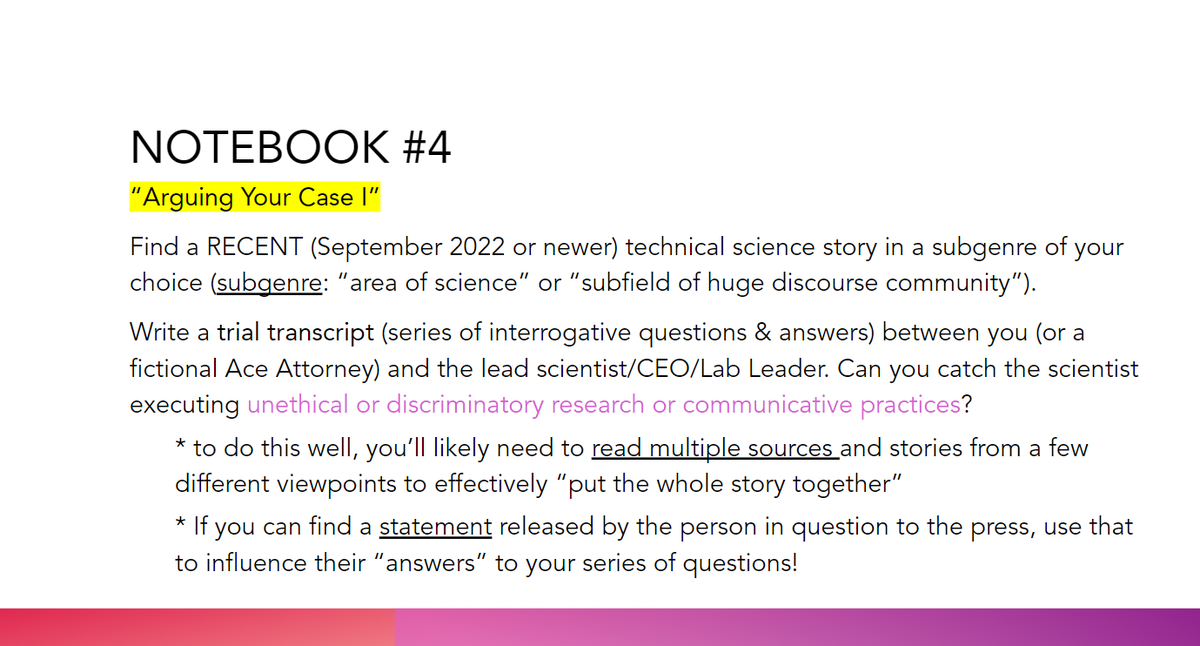
WEEK SIX
now we have enough information to get into "Reading Real Science" investigation: i give them two high-level articles and explain the CARS and IMRAD reading protocols, broadly construed. these two techniques find VERY DIFFERENT INFO, and we need to know how to deal it:
now we have enough information to get into "Reading Real Science" investigation: i give them two high-level articles and explain the CARS and IMRAD reading protocols, broadly construed. these two techniques find VERY DIFFERENT INFO, and we need to know how to deal it:

WEEK SIX
this lab is designed to be frustrating: reading "real" science is difficult! this is the worksheet i give them. the key takeaway is:
💛IMRAD method: what information is LITERALLY here?
💛CARS method: what information is MISSING here? (who is left out, or implied?)
this lab is designed to be frustrating: reading "real" science is difficult! this is the worksheet i give them. the key takeaway is:
💛IMRAD method: what information is LITERALLY here?
💛CARS method: what information is MISSING here? (who is left out, or implied?)

WEEK SIX
at the halfway point, they also do the Midpoint Review Worksheet in teams. it's a three page review of all the theory we did in the first half, parsed in a simplified way. they need this theory to understand the second half of the course, so this is important now.
at the halfway point, they also do the Midpoint Review Worksheet in teams. it's a three page review of all the theory we did in the first half, parsed in a simplified way. they need this theory to understand the second half of the course, so this is important now.

WEEK SEVEN
okay, let's make this harder!
week seven introduces disability and universal design for learning to the conversation.
how is science inaccessible? how are we creating or sustaining discourse communities that exclude certain scientists over and over again?
okay, let's make this harder!
week seven introduces disability and universal design for learning to the conversation.
how is science inaccessible? how are we creating or sustaining discourse communities that exclude certain scientists over and over again?

WEEK SEVEN
their investigation this week was to really pay attention in their labs in other courses... how many things/objects are usable? who is left out?
this is my favourite entry from all sections of scicomm i've done: they do a great job with this entry, and get honest.
their investigation this week was to really pay attention in their labs in other courses... how many things/objects are usable? who is left out?
this is my favourite entry from all sections of scicomm i've done: they do a great job with this entry, and get honest.

WEEK EIGHT
now it's time for sexism in science, #YesAllWomen, #WomenInSTEM etc. i've done threads about this week's content in the past, so this is a recap:
- introduce gender bias versus parity
- MARKETING inclusivity versus REAL inclusivity
- callback to their stories/lxp
now it's time for sexism in science, #YesAllWomen, #WomenInSTEM etc. i've done threads about this week's content in the past, so this is a recap:
- introduce gender bias versus parity
- MARKETING inclusivity versus REAL inclusivity
- callback to their stories/lxp

WEEK EIGHT
this week's "find it, prove it" investigation is one of their favourites: everyone comes to class with the name of a FEMALE scientist, and they must go around the room trading scientists and their accomplishments to FILL their bingo cards w/amazing women's research!💜
this week's "find it, prove it" investigation is one of their favourites: everyone comes to class with the name of a FEMALE scientist, and they must go around the room trading scientists and their accomplishments to FILL their bingo cards w/amazing women's research!💜
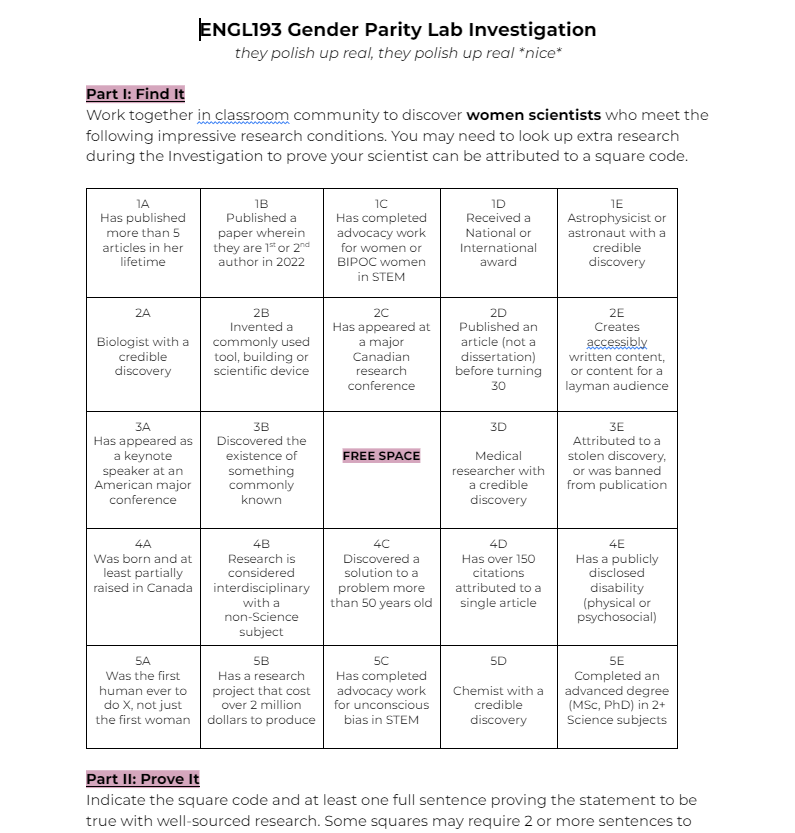
WEEK EIGHT
with 1 month left, they use everything they learned on the team midterm to do the same thing (on a different thesis) again on their own - they should be much more prepared to do this independently b/c of the scaffolded reinforcement. MAKE PEOPLE CARE is the point.
with 1 month left, they use everything they learned on the team midterm to do the same thing (on a different thesis) again on their own - they should be much more prepared to do this independently b/c of the scaffolded reinforcement. MAKE PEOPLE CARE is the point.

WEEK NINE
now we're tying it all together. I use the Ice Cream Debate scene from Thank You for Smoking as a way to talk about the 3 core argument components: well-sourced research, counterstorying, and lived experience expertise. This is difficult, give me a couple tweets here:
now we're tying it all together. I use the Ice Cream Debate scene from Thank You for Smoking as a way to talk about the 3 core argument components: well-sourced research, counterstorying, and lived experience expertise. This is difficult, give me a couple tweets here:

the arg Eckhart has is "chocolate vs vanilla" and he spins it toward capital-T truth in order to "win", instead of dealing with veracity. the "point" is that his son was not worth convincing - everyone listening to the argument was. this is core political rhetoric. Aaron Eckhart
says "if you're wrong, i'm right, and if i'm right, i win". think of conference panels that went just like this...
we're not after experts in our field, we're after *them* - the listeners and skeptics. our job is to make them care. i used accessibility to say this another way:
we're not after experts in our field, we're after *them* - the listeners and skeptics. our job is to make them care. i used accessibility to say this another way:

WEEK NINE
great! Now we can bring back "Reading Real Science" again. this reinforces their first attempt, but also introduces all these more difficult, intersectional ways of mediating information this time...
they translated a gender bias article, and a racial bias article.
great! Now we can bring back "Reading Real Science" again. this reinforces their first attempt, but also introduces all these more difficult, intersectional ways of mediating information this time...
they translated a gender bias article, and a racial bias article.

WEEK TEN
the Teach-Arounds are 5min talks based on a well-written thesis they created. I give no rubric and a 3-slide limit. everything else is up to them.
By Week 10, they have been taught ALL THESE BELIEVABILITY SKILLS and had them reinforced in other student presentations:
the Teach-Arounds are 5min talks based on a well-written thesis they created. I give no rubric and a 3-slide limit. everything else is up to them.
By Week 10, they have been taught ALL THESE BELIEVABILITY SKILLS and had them reinforced in other student presentations:

WEEK TEN
this week is visual rhetoric, students always love this lmao. i tie it to graphic design, doxa, semantics and iconicity and walk them through a billion examples (including the twitter Blue Checkmark @Jessifer ).
now we're tying ethics of design choice to argumentation.
this week is visual rhetoric, students always love this lmao. i tie it to graphic design, doxa, semantics and iconicity and walk them through a billion examples (including the twitter Blue Checkmark @Jessifer ).
now we're tying ethics of design choice to argumentation.

WEEK TEN
the Design Demolition Derby lab is reinforced in class with a round-robin drawing series of iconic logos, apps, social media signals etc. after we do that, they have to find questionable graphic designs on their own and write about the rhetorical conversation happening.
the Design Demolition Derby lab is reinforced in class with a round-robin drawing series of iconic logos, apps, social media signals etc. after we do that, they have to find questionable graphic designs on their own and write about the rhetorical conversation happening.

WEEK TEN
probably my favourite hyper-recent example of visual rhetoric's incredible storytelling power.
the most expensive iconographic misplay of ALL TIME. OF ALL TIME. billions of dollars in visual rhetoricity here guys it's wild
probably my favourite hyper-recent example of visual rhetoric's incredible storytelling power.
the most expensive iconographic misplay of ALL TIME. OF ALL TIME. billions of dollars in visual rhetoricity here guys it's wild

WEEK ELEVEN
the *instascience* lab ties all the course theory together. they have to read, translate, and graphically re-present a high-level compsci journal article in a way that makes non-academics CARE about the research (in this case, Canadian Data Privacy Laws). MOBILIZE.
the *instascience* lab ties all the course theory together. they have to read, translate, and graphically re-present a high-level compsci journal article in a way that makes non-academics CARE about the research (in this case, Canadian Data Privacy Laws). MOBILIZE.
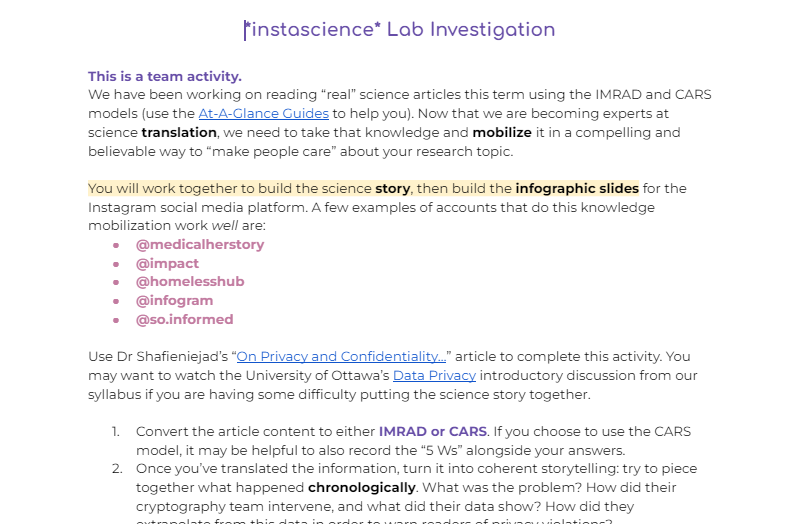
WEEK ELEVEN
at this point, I also do a little bit of theory on the ACCESSIBLE SCIENTIFIC ABSTRACT or article summary. no one wants to read research that doesn't make them care. it's our job to make them want to read our publications: not the other way around! easy lesson.
at this point, I also do a little bit of theory on the ACCESSIBLE SCIENTIFIC ABSTRACT or article summary. no one wants to read research that doesn't make them care. it's our job to make them want to read our publications: not the other way around! easy lesson.

WEEK TWELVE
bring back 1984 and ask them to use everything on this course to point out rhetorical control methods and ways The Party markets themselves as believable. they are GREAT at this, and they notice for themselves that somewhere in here, they actually learned something.
bring back 1984 and ask them to use everything on this course to point out rhetorical control methods and ways The Party markets themselves as believable. they are GREAT at this, and they notice for themselves that somewhere in here, they actually learned something.
WEEK TWELVE
now they do the Endpoint Review Worksheet. this reinforces all the complicating theory from the second half of the course, and tries to simplify it: intersectionality, jingoism, universal design, inferencing, "who's left out?", advanced presentation skills, vis rhet.
now they do the Endpoint Review Worksheet. this reinforces all the complicating theory from the second half of the course, and tries to simplify it: intersectionality, jingoism, universal design, inferencing, "who's left out?", advanced presentation skills, vis rhet.

WEEK TWELVE
their exam for this course is a portfolio of their 5 best notebooks + community callback + exit interview.
i am especially proud of the exit interview, and they do AMAZING on this 99/100 times. they retell to me their learning pathway in their own words w/honesty. 💚
their exam for this course is a portfolio of their 5 best notebooks + community callback + exit interview.
i am especially proud of the exit interview, and they do AMAZING on this 99/100 times. they retell to me their learning pathway in their own words w/honesty. 💚

my job in this course is to teach groups of students who HATE english (they are high-achieving STEM majors) that rhetoric is important, and making people care is the game of academia. they are incredibly hostile to "traditional" english, so i spent a lot of time on this design.
they are literally primed to hate me and this course based on what i am being asked to teach and reinforce, and they come out of this "surprised that they actually learned a lot" and asking if there is a 200 level scicomm (there isn't LOL). so this model CAN work, maybe.
EVERYTHING i use: full slideshows, all worksheets, handouts, instructions and checklists are in that Drive for you. you can use as MUCH or as LITTLE as you'd like. make it better than i could - and show me what you did!! 🖤🤍🌻
these courses can be fun and enriching, i promise.
these courses can be fun and enriching, i promise.
this resource thread is for: @PhD_Genie #WomenInSTEM @CAST_UDL @udlhe @DisInHigherEd @DisabledAcadem @OpenAcademics @academicswrite @CASDW_ACR @MyTeachingTools @TeachingTesting @AccessMaking @RadMadLab and #AcademicTwitter @AcademicChatter 💜
PLEASE USE & REMIX THESE TOOLS! 🥰
PLEASE USE & REMIX THESE TOOLS! 🥰
and i have to thank: @EdDevTrevor @sarahesilverman @AnnGagne @brennacgray @disabledphd @PriceMargaret @lecagle @KateMadd @rogergraves @smhumphreys @JayDolmage @jstickgoldsarah @Katja_Thieme because a lot of this is based on methods i've learned from y'all. thank you sincerely🤍☀️
• • •
Missing some Tweet in this thread? You can try to
force a refresh





